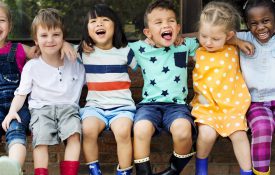-
2015 Golden Goose Award: THE MARSHMALLOW TEST
The Golden Goose Award: Dr. Walter Mischel was once told he would be better off asking a candy company to fund research on his “marshmallow test,” rather than the National Institutes of Health (NIH). But fifty years on, the renowned psychologist’s federally funded research---in collaboration with his colleagues Drs. Philip Peake and Yuichi Shoda--- has had enormous and unexpected impact on our understanding of human development, self-control, education, and the complexity of human behavior. The origins of Dr.
-
Giving Teachers the Tools to Help Build Resiliency
The Huffington Post: For children who grow up facing adversity in their home, their path out is often lit by a teacher. I have spent tens of thousands of hours interviewing and reading the stories of those who grew up facing adversity in their childhood home. So often, the child who grows up to become a resilient adult does so because a school teacher stepped in to help them unlearn a lie or a negative belief that they carried deep inside. But far too often this happens randomly, almost by accident. The New York City Department of Education and New York City Mayor's Office to Combat Domestic Violence is working to make what is now random, predictable.
-

Kids’ Altruism Linked with Better Physiological Regulation, Less Family Wealth
Children as young as 4 years old may reap better health from altruistic giving, a behavior that tends to be less common among kids from high-income families.
-
Why Do We Love Our Pets So Much?
BBC: When four chimpanzees captured a young blue duiker to play with, you might at first believe they wanted to keep it as a pet. They tumbled about with it but in the end it went badly for the antelope. Their playful behaviour was too rough and ended in its death. The chimpanzees continued to play with the corpse for another 30 minutes. This was a special case. The duiker was not a "pet" in the sense as we know it. Animals do not keep pets; you won't see a chimpanzee taking a dog for a walk or an elephant keeping a tortoise for company. Making an animal part of the family seems to be something only humans do. The question is, why? Read the whole story: BBC
-
Does Google Help Students Learn (or Just Think They Do?)
Education Week: There's no question that in the era of the smartphone, the Internet has become a go-to place to find out something in a hurry, but does "outsourcing your memory" actually help students learn new concepts, or does it just make people think they are smarter than they are? A little of both, find researchers at the annual Association for Psychological Science conference here. In a symposium on the effects of students' online searches, several studies looked at how using the Internet affects both the way we remember and the way we think about what we learn. Analyzing about 900 college students' search habits, Adrian F.
-
Reducing Prejudice While You Sleep
Pacific Standard: Prejudices tend to lurk in our unconscious minds. Few Americans would admit to holding stereotyped views of blacks or women, but tests designed to measure underlying thought patterns suggest the presence of buried biases that still influence our opinions and behavior. The good news is these harmful assumptions are learned, and they can be unlearned. Newly published research suggests such biases can be diminished with the help of the simplest and most natural process imaginable: Sleep.

